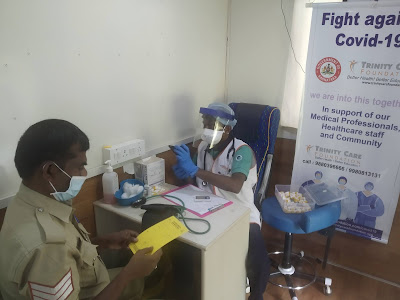There is an increasing awareness nowadays of Corporate Social Responsibility (CSR) with the growing concern about developmental issues. Hence, for companies, doing well and doing good simultaneously is of paramount importance.
The Sustainable Development Goals (SDGs) focus to end poverty, protect the planet and ensure prosperity for all, as part of a new sustainable development agenda. India has also signed the declaration for sustainable development along with other countries. While the government initiatives in India are linked to achieving SDGs !
The spirit of the Companies Act is to ensure that CSR initiatives are aligned with the national priorities and enhance engagement of the corporate sector towards achieving Sustainable Development Goals (SDGs).If SDGs must be achieved within 2030 agenda, all the agents of change should work in harmony – be it governments, communities, companies or non-profits themselves.
Some of the CSR Projects implemented by Trinity Care Foundation, aligned with UN's sustainable development goals;
Goals 3 : Ensure healthy lives and promote well-being for all at all ages.
In the Photo: Community Health Program in a PHC, Karnataka by Trinity Care Foundation.Goals 4 : Ensure inclusive and equitable quality education and promote lifelong learning opportunities for all.
Goals 7 : Ensure access to affordable, reliable, sustainable and modern energy for all.
In the Photo: 5KW Hybrid Solar System in a Government School, Karnataka by Trinity Care Foundation.If you are eager to execute turnkey CSR projects as per schedule VII of the Companies Act 2013 that is eligible to receive CSR funding either directly or through an implementing agency that has a track record. Send an email to support@trinitycarefoundation.org or call Dr. Thomas +91 9880 39 6666 or Mr. Binu +91 9880 35 8888.
About Us :
Trinity Care Foundation (TCF) a 15 year old Non-Profit Organization, has the Trust registration, PAN, TAN, 12AB, 80G, Professional tax and FCRA. It is registered with NITI Aayog, Government of India. TCF has registered with Ministry of Corporate Affairs (MCA) for undertaking Corporate Social Responsibility (CSR) activities and the registration number is CSR00003858.
Write to ( support@trinitycarefoundation.org ) for implementing CSR Projects in alignment with UN's SDGs.
Trinity Care Foundation is a network of highly accomplished and networked professionals in Karnataka state, India. They aim to solve the challenges of healthcare/education in India by working in synergy with the government system.
For Partnership,
Visit -> http://www.trinitycarefoundation.com/csr
Write to – support@trinitycarefoundation.org or
Call Dr. Thomas +91 9880 39 6666 or Mr. Binu +91 9880 35 8888
Executed CSR Projects : https://www.flickr.com/photos/trinitycarefoundation/albums


























